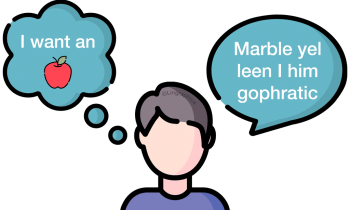Mixed Transcortical Aphasia
Mixed Transcortical Aphasia is a type of aphasia in which repetition is the primary language ability that is present. It is an uncommon type of aphasia. Mixed transcortical aphasia has also been called isolation aphasia. It is considered a more severe form of aphasia. It is similar to global aphasia, with the exception of more functional repetition skills.
Characteristics of Mixed Transcortical Aphasia
- Severe impairment in spoken language:
- Speech is non-fluent, meaning that it is slow and halting
- Speech does not have typical rhythm or prosody
- Spoken language is often a repetition of what is said to them, or echolalia
- Difficulty initiating speech or creating spontaneous language
- Language comprehension impairments are present
- Reading is impaired
- Writing ability is impaired; likely resembles spoken language
- Repetition skills are a strength:
- Repetition skills might be completely intact or mildly impaired, i.e. many people might be able to repeat a 3-4-word sentence
Mixed Transcortical Aphasia Causes and Treatment
Mixed transcortical aphasia is due to damage that is near the language centers of the brain. The language centers include Broca’s area (responsible for language production) and Wernicke’s area (responsible for language comprehension). However, it is not due to damage directly to those areas. Rather, it isolates those areas from the rest of the brain.
It is often helpful to incorporate gestures, drawings, and pictures into communication. Pictures and drawings are easier for people with mixed transcortical aphasia to understand than words. It can also be helpful to speak slowly and focus on key words.
Seeing a speech-language pathologist (SLP) as soon as possible can be very helpful for someone with mixed transcortical aphasia. Recovery is most significant soon after a stroke, and an SLP can help maximize improvements.
Click on the tiles below to learn more about the most common types of aphasia.
Anomic Aphasia

Global Aphasia

Transcortical Motor Aphasia

Broca's Expressive Aphasia

Mixed Transcortical Aphasia

Transcortical Sensory Aphasia

Conduction Aphasia

Primary Progressive Aphasia

Wernicke's Aphasia

